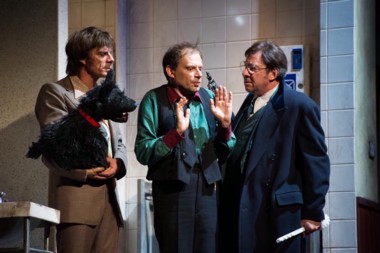I was in Paris last month and dropped in at the Comédie-Française, that venerable heir to Molière and Feydeau. They weren’t playing Moliëre, though, or even a comedy, but that most profound and vexing of Shakespearean dramas. La Tragédie d’Hamlet, playing through Jan 12 (www.comedie-francaise.fr), is performed in French—with the exception of six famous words—and true to the company’s determination to avoid being a hidebound museum of tradition, is given a mischievous modern-dress staging set in a tacky Mafia clubhouse of the 1970s Godfather era. And surprisingly, delightfully, it works.
I speak Shakespeare better than French, but between the two I managed to keep up with the verse rendering by Yves Bonnefoy, France’s premier poet/translator. The production, by Paris-based British director Dan Jemmett, has what you (or Hamlet) might call an antic disposition. It’s self-consciously jokey, skating audaciously close to the thin ice between playful and parody.
The setting is one of those shady bars where shady characters exchange wicked thoughts and wads of cash. A garish jukebox blares C&W and R&B (“Please Release Me” is on the turntable when the ghost of Hamlet’s father appears) and sports memorabilia line the walls—the club’s interest is in fencing, so racks of rapiers are conveniently at hand.
In his program note, the director muses on the soap opera form as domestic epic, and here the fraught family dynamics are laid on pretty broadly. Claudius, the oily usurper who has won a turf battle by knocking off his brother, growls orders to underlings and plays drinking games with his trophy wife. Polonius is no garrulous old fool, but a party animal who can’t help giving Queen Gertrude a cheeky pinch on her, well, cheek. And Rosenkranz is a puppet on the arm of ventriloquist Guildenstern.
Some key moments occur in the gents’ and ladies’ rooms which flank the stage, their outer walls invisible. When grief-maddened Ophelia, in waist-long hair and pink stilettos, does herself in, she takes an overdose of pills and expires in the toilet stall. Earlier, as he relieves himself in the men’s, Hamlet reads a suicide-prevention poster on the wall above the urinal, below which someone has scrawled (in English) “To be or not to be,” setting him off on that timeless meditation.
Denis Podalydès is a grumpy, rumpled Hamlet in a black overcoat and blacker mood. No spry young student, either, but closer to 50 than 20. (It’s one of those parts every leading actor yearns for but which may not come along till he’s beginning to think about Lear.)
Despite the more-than-irreverent take on the revered text, the core of the drama is never sacrificed to the jokes and the framing concept never stretched out of bounds. Indeed, when the conventions no longer serve they’re simply abandoned. The gravedigger who prepares for Ophelia’s burial comes on as a beer delivery man, lowers the kegs through a trapdoor in the stage floor and then jumps down and starts shoveling out dirt.
The French press largely sniffed at the show’s impudent liberties, but I liked it, and so did the sold-out house, which gave the actors four repeat curtain calls—and without jumping to their feet as American audiences seem to do as a matter of course.•
Chris Rohmann is at StageStruck@crocker.com and his StageStruck blog is at valleyadvocate.com/blogs/stagestruck.



